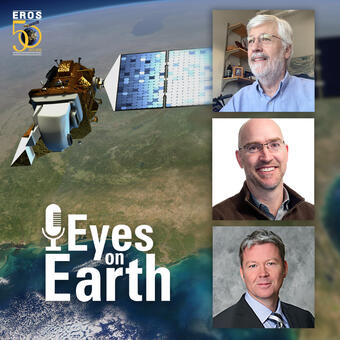David Roy discusses importance of Landsat Science Team on USGS EROS Center podcast
June 11, 2023
 David Roy, MSU professor of geography and director of the Center for Global Change and Earth Observations, was recently featured on a podcast produced by the USGS Earth Resources Observation and Science (EROS) Center. As part of the Eyes on Earth podcast series, Dr. Roy joined fellow Landsat Science Team members Drs. Curtis Woodcock (Boston University) and Mike Wulder (Canadian Forest Service) for a discussion about the relevance of Landsat to the world's problems and the Landsat Science team's work in providing scientific and technical guidance to NASA and the USGS on issues critical to the success of the Landsat program.
David Roy, MSU professor of geography and director of the Center for Global Change and Earth Observations, was recently featured on a podcast produced by the USGS Earth Resources Observation and Science (EROS) Center. As part of the Eyes on Earth podcast series, Dr. Roy joined fellow Landsat Science Team members Drs. Curtis Woodcock (Boston University) and Mike Wulder (Canadian Forest Service) for a discussion about the relevance of Landsat to the world's problems and the Landsat Science team's work in providing scientific and technical guidance to NASA and the USGS on issues critical to the success of the Landsat program.
The Landsat satellite series is the longest satellite record acquiring global observations for the last 50 years, capturing a period when the global human population has more than doubled and evidence for climate change has become discernible. Data from the Landsat program provides scientists and decision-makers with information essential for making informed decisions about the environment, human land cover and land use change, and the impact of land use and climate change on the Earth's resources.
Led jointly by the USGS and NASA with a strong tie to EROS, five-year Landsat Science Team members have brought a wide breadth of expertise, backgrounds, and geographic locations to the table for nearly 30 years. Dr. Roy is nearing the end of his second five-year term as co-lead for the team.
Listeners of the episode hosted by Jane Lawson and entitled "EROS 50th: Landsat Science Team" will learn how members of the team have explored strategies for the effective use of archived Landsat data and integration of future data and how they have helped identify Landsat user needs for the upcoming next generation of Landsat sensors. The episode is available on a variety of podcast hosting platforms, including Apple Podcasts, Spotify, and Google Podcasts. The episode is also available on the web at the Eyes on the Earth website.

